
OR
Nepali industrialists and businessmen face blacklisting amid economic downturn
Published On: January 12, 2024 05:38 PM NPT By: Dilip Paudel
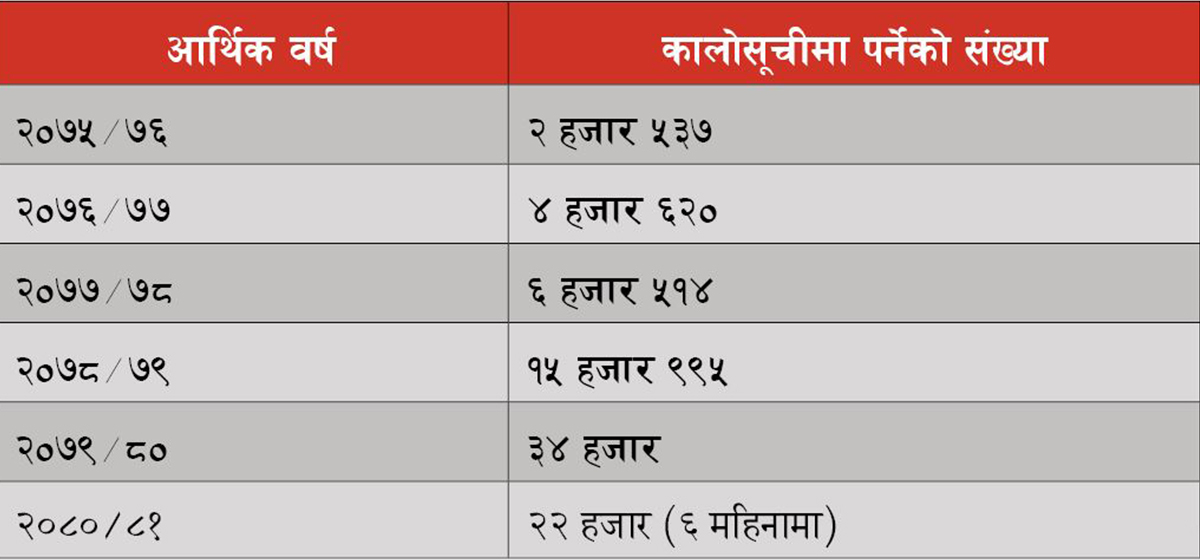
Over 78,000 industrialists and businessmen blacklisted, 22,000 added in six months
KATHMANDU, Jan 12: Prabin Gurung, who started a business in order to contribute domestically without seeking foreign employment, now has to face difficulty as the land he mortgaged while taking a loan has gone up for auction. Gurung started a clothing store in Kathmandu. After starting the business, there was the onset of the Covid-19 pandemic. As there was a decline in trade, investment sank. "Due to poor business conditions, I could not pay the principal and interest of the bank loan," said Gurung, "The bank has held a mortgage auction because I was unable to manage the loan," Gurung stated.
Due to the impact on the country's economy after the Covid-19 pandemic, industrialists and businessmen are grappling with financial difficulties. Due to the deterioration of the business environment, many industrialists and businessmen like Gurung have been unable to pay their debts.
Economic downturns affect businesses at all times. Due to the failure to create the expected demand in the market, there is a slowdown in the economy. With the economic downturn, there has been an increase in the blacklisting of industrialists. The number of borrowers getting blacklisted due to non-payment of loans taken from banks and financial institutions and bounced checks is increasing day by day.
Bijay Kunwar, the spokesperson for the Credit Information Bureau, said that the number of blacklisted individuals is doubling every year since the onset of the Covid-19 pandemic. According to Kunwar, since the month of Shrawan (mid-July to mid-August) of the current fiscal year, the number of blacklisted persons has increased by 22,000. According to the Bureau, 78,598 people have been blacklisted so far. Spokesperson Kunwar said that 150 individuals are being blacklisted daily. In the last fiscal year (FY) 2022/23, as many as 34,000 were blacklisted. In FY 2021/22, a total of 15,995 people were blacklisted, and in FY 2020/21, as many as 6,514 people were blacklisted. Similarly, 4,620 people were blacklisted in FY 2019/20 and 2,537 in FY 2018/19.
When the borrower is unable to pay the loan-interest taken from the bank and financial institutions and the check given to the payee does not have sufficient funds in the account, they are blacklisted after the check is bounced. According to the Bureau, if a person who has taken a loan from a bank or financial institution does not pay the loan interest for nine months, they will be blacklisted on the recommendation of the concerned institution. If a check bounces three times, one will be blacklisted on the basis of complaints and on the recommendation of banks and financial institutions.
Bankers say blacklisting and auctions are increasing at a time when the business environment of the country is not improving. Ashok Sherchan, chief executive officer (CEO) of Prabhu Bank, said that he had signed about 100 auction notices from Itahari to Martadi on the same day. "The number of industrialists and businessmen who are auctioned and blacklisted is increasing," Sherchan said.
He said that auctions and blacklisting have increased because business has declined and industries are not operating at their capacity.
According to the private sector, industrialists and businessmen have been blacklisted due to high interest rates of banks and financial institutions, trade and business have declined. After the Covid-19 pandemic, there was a problem in the economy after the demand and supply chain in the market was affected. Then, the economy contracted as foreign exchange reserves dwindled as the government clamped down on imports.
Rajendra Malla, president of Nepal Chamber of Commerce, said that since the number of blacklisted businessmen has increased, Nepal Rastra Bank should facilitate the solution to the problem.
"Because the interest rate of the bank is expensive, there is difficulty in paying the principal and interest," said Malla, "We should reduce the interest rate and reschedule the loan," he added. "We should save from auctioning mortgages by extending the loan repayment period," said Malla.
Bad loans have also increased as borrowers are unable to pay the loan principal and interest as per the schedule. Bad loans were 2.7 percent in the first quarter of last year, but bad loans increased to 3.4 percent in the same period of the current year. The Confederation of Nepalese Industries (CNI) published a study report on the state of Nepal's economy and said that the economy has slowed down due to the failure to create the expected demand in the market. According to the CNI, due to economic slowdown, the blacklisting of industrialists and businessmen has surged.
You May Like This
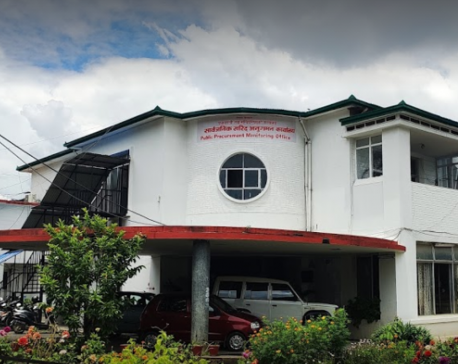
PPMO blacklists five companies
KATHMANDU, Dec 5: The Public Procurement Monitoring Office (PPMO) under the Office of the Prime Minister and Council of Ministers... Read More...
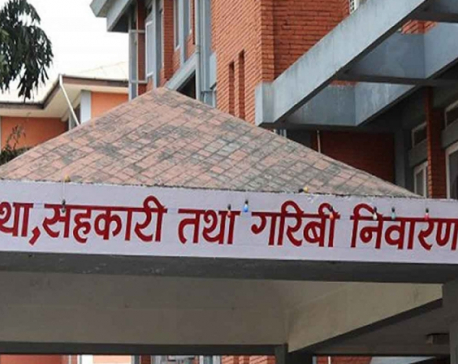
Govt to blacklist 11 cooperatives unable to pay back depositors’ money
KATHMANDU, Nov 8: The government has decided to blacklist 11 financially troubled cooperatives which have been unable to pay back the... Read More...
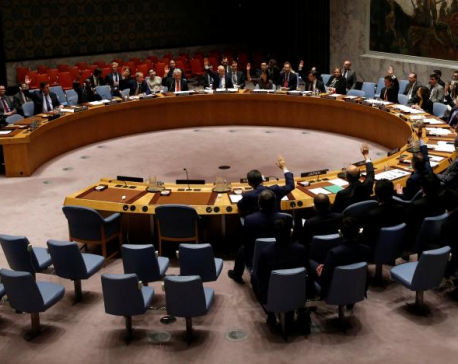
U.N. expands North Korea blacklist in first U.S., China sanctions deal under Trump
WASHINGTON, June 3:The U.N. Security Council on Friday expanded targeted sanctions against North Korea after its repeated missile tests, adopting... Read More...



Just In
- 3rd Investment Summit: Govt seeking letters of intent for 20 projects
- Gold price increases by Rs 400 per tola
- ‘We have established a long-term vision and policy stability in key investment sectors’
- FNCCI President Dhakal invites investors to explore Nepal's promising sectors
- The South Korean Development Formula
- T-20 series: Nepal playing second match against West Indies ‘A’ today
- Investing in Nepal: Challenges and Opportunities
- ‘Nepal should focus on ease and speed of doing business’







-1200x560-wm_20240427144118.jpg)






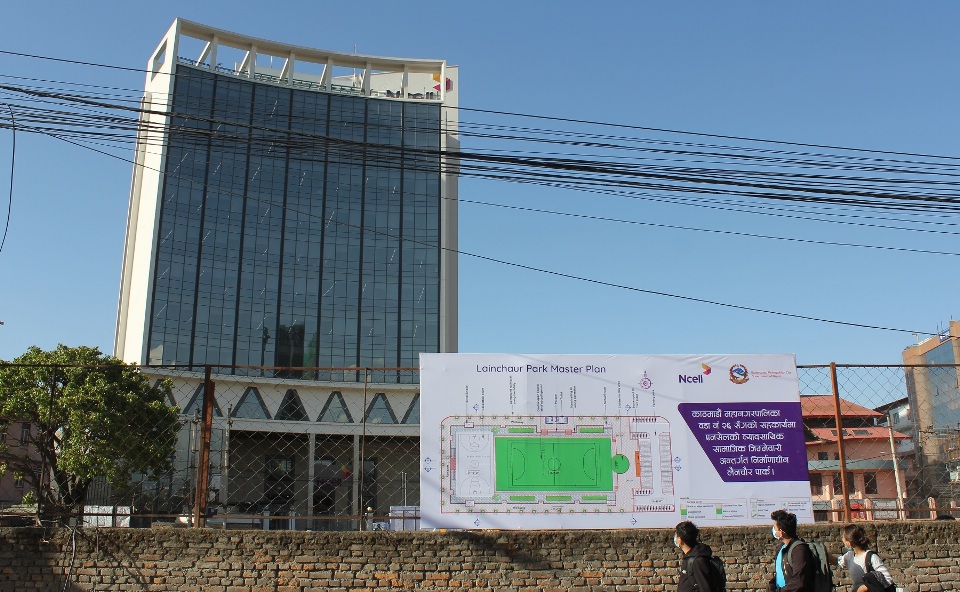

Leave A Comment